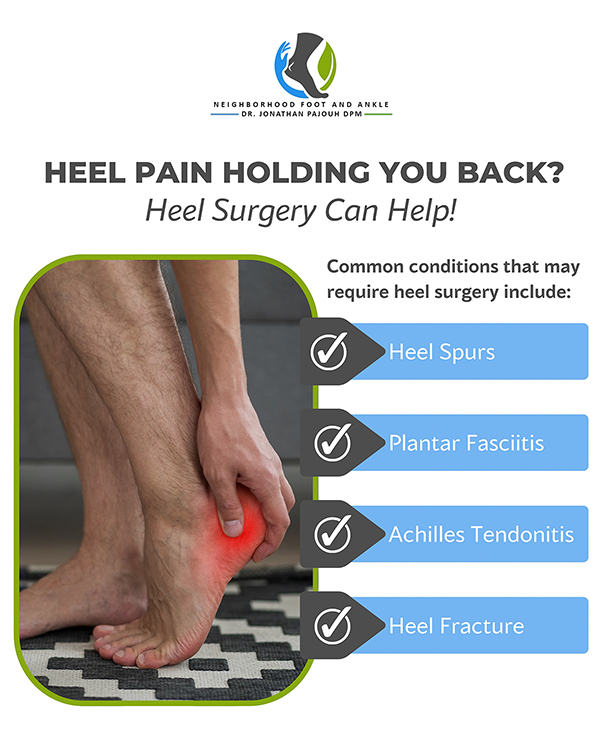
Heel Surgery: When Conservative Care Isn’t Enough
Heel pain is one of the most common foot complaints, affecting people of all ages and activity levels. Whether caused by repetitive strain, acute injury, or chronic inflammation, heel discomfort can disrupt daily life and limit mobility. While many patients find relief through conservative treatments such as rest, physical therapy, or orthotics, some conditions may ultimately require surgical intervention.
What Is Heel Surgery?
Heel surgery is a medical procedure performed to alleviate persistent heel pain and restore mobility. It is typically considered only after non-surgical treatments have failed to provide relief. The goal of heel surgery is to address the underlying cause of the pain, whether it's related to bone abnormalities, connective tissue inflammation, or trauma. A podiatric foot and ankle surgeon will evaluate your symptoms, perform diagnostic imaging (such as X-rays or MRIs), and determine whether surgery is the appropriate course of action.
Common Conditions That May Require Heel Surgery
Several foot and ankle conditions can lead to chronic heel pain, some of which may necessitate surgical correction if symptoms persist:
1. Heel Spurs
Heel spurs are calcium deposits that form a bony protrusion on the underside of the heel bone. They are often caused by excessive stress or strain on foot muscles and ligaments, particularly in individuals who are highly active or who stand for extended periods. Although heel spurs themselves may not always cause pain, they often occur in conjunction with plantar fasciitis and can contribute to overall heel discomfort. Surgery may be needed to remove the spur and alleviate surrounding tissue irritation.
2. Plantar Fasciitis
Plantar fasciitis is a condition involving inflammation of the plantar fascia—a thick band of connective tissue running along the bottom of the foot, from the heel to the toes. This condition is one of the most common causes of heel pain, especially in runners and individuals with high arches or flat feet. Conservative treatments like stretching, anti-inflammatory medications, and supportive footwear can often help, but chronic cases may require a surgical release of the plantar fascia to relieve tension and inflammation.
3. Achilles Tendonitis
Achilles tendonitis refers to inflammation of the Achilles tendon, which connects the calf muscles to the heel bone. Overuse, tight calf muscles, or improper footwear can contribute to this condition. In cases where the tendon has degenerated or torn, surgery may be necessary to repair the damage and restore strength and flexibility to the ankle and heel.
4. Heel Fracture
A heel fracture involves a break in the calcaneus, the large bone forming the heel. These fractures can occur due to high-impact trauma, such as a fall from height or a car accident. Depending on the severity and type of fracture, surgical intervention may be required to realign the bone fragments and stabilize the heel using plates or screws.
What to Expect From Heel Surgery
Heel surgery varies based on the underlying condition and the specific procedure being performed. Recovery times also vary, but most patients can expect a combination of rest, physical therapy, and gradual return to weight-bearing activities.
Some procedures may require temporary use of crutches or a walking boot, while others may involve a longer rehabilitation period. Your podiatric surgeon will provide detailed post-operative care instructions to ensure optimal healing.
Is Heel Surgery Right for You?
If you’ve been dealing with chronic heel pain that hasn't improved with conservative care, it's time to consult a podiatric foot and ankle specialist. A comprehensive evaluation can help determine the root cause of your pain and whether surgery is the best next step.
Delaying treatment for chronic heel conditions can lead to more complex issues over time, including altered gait, joint strain, and long-term mobility problems. Early intervention with a qualified foot specialist increases the likelihood of a full recovery.
Why Choose a Specialist in Dallas, Texas?
At our Dallas-based foot and ankle clinic, we specialize in diagnosing and treating heel-related conditions through advanced surgical and non-surgical methods. Dr. Jonathan Pajouh, a board-certified podiatric foot and ankle surgeon, has extensive experience in reconstructive and minimally invasive procedures that help patients return to a pain-free lifestyle.
Take the First Step Toward Relief
Chronic heel pain doesn't have to control your life. Whether you’re suffering from plantar fasciitis, heel spurs, or tendonitis, we’re here to help you get back on your feet—literally. If conservative treatment options haven't provided relief, it may be time to explore heel surgery as a long-term solution.
Schedule Your Consultation Today
If you're located in or around Dallas, Texas, and are experiencing ongoing heel pain, schedule a consultation with our experienced foot and ankle team. Visit our contact page to request an appointment and start your journey toward lasting relief:
Contact Us – Reconstructive Podiatric Foot & Ankle Surgeon, Dallas TX
